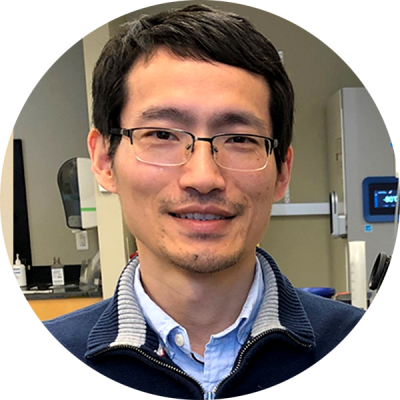
Mengfei Chen
In our nose, the sense of smell is mediated by the olfactory mucosa, a neuroepithelial tissue containing long-lived olfactory stem cells. Even though these stem cells possess a remarkable capacity for regeneration, the loss of the sense of smell is a common symptom in the setting of chronic inflammatory rhinosinusitis. Deepening our understanding of the stem cell behavior has the potential to inform novel treatment strategies for inflammation-related olfactory deficits.
In Andrew Lane’s Lab, my research focuses on the cross-talk between olfactory stem cells and the local immune system in acute or chronic inflammation. We observed that the basal stem cell population was activated in the inflammatory environment and directly contributed to the disease pathology. Our study establishes a mechanism of chronic rhinosinusitis-associated olfactory loss, caused by a functional switch of neuroepithelial stem cells from regeneration to immune defense. The immune activity of basal stem cells in communicating with infiltrating inflammatory cells may play a more generalized role in mucosal immunity at epithelial barrier surfaces in health and disease.
Questions & Answers
Why did you choose Johns Hopkins for your work?
As a researcher, I have read a tremendous number of papers with significant discoveries in the field of biomedical research performed at Johns Hopkins. I have come to appreciate that Johns Hopkins has the best scientists and clinicians across many disciplines in biology and medicine, especially in my field of interest, olfactory stem cells and human nasal diseases.
What does receiving this award mean to you personally and professionally? Do you have any connection with the particular award you received?
The award recognized the scientific achievements and dedication of not only myself, but also my co-workers and mentor. It has also motivated me strongly to continue to pursue the next significant research finding. Dr. A. McGehee Harvey was renowned for the application of research to medical care. The award in his name particularly fit our work, as our efforts in Dr. Lane’s lab are trying to bring the findings from the lab to the clinic.
What contributed to your project’s success?
My project’s focus is with translational research from a mouse model to human disease. Our team has an outstanding clinician, my mentor, Dr. Lane, who generated the transgenic mouse model. I was also fortunate enough to have one of the most renowned pioneers and influential figures in olfactory research, Randall Reed, Ph.D., to give me expert advice on my olfactory stem cell journey. Under their guidance I am able to think deeply and critically about important questions in the field and to design and execute experiments to address them fully. Our lab members, including Heather Kulaga and Amy Smith, have always provided support for my projects. In addition, the Center for Sensory Biology has been a source of technical and research support, lending a wealth of knowledge and expertise.
What thoughts do you have about Young Investigators’ Day itself, as a celebration of the roles students and fellows play in research at Johns Hopkins?
The Young Investigators’ Day is one example of the truly excellent academic environment at Johns Hopkins that nurtures the early careers of students and fellows. The event recognizes and celebrates the important role that students and fellows play in the advancement of scientific research at Johns Hopkins, and will encourage other young individuals to achieve great things in pursuit of their goals and interests.
What has been your best/most memorable experience while at Johns Hopkins?
At Johns Hopkins, I’m able to learn cutting-edge science and skills from the most talented researchers and clinicians in the world. I have many “most” memorable experiences, ranging from the moment that I saw my mentor, Dr. Lane, carrying samples from the operating room to the lab; or times that I ran into distinguished professors in the animal facility; or when I have discussed original exciting images with Dr. Lane and Dr. Reed. While not necessarily uncommon, these memorable moments inspire me to pursue new findings every day.
What are your plans over the next year or so?
I was promoted to a faculty position in our department recently and am working toward independent funding.
Tell us something interesting about yourself.
Besides the research in the lab, I enjoy time with my two little lovely children and the rest of my family. I have learned a lot of children’s songs, which I can sing with them on trips.